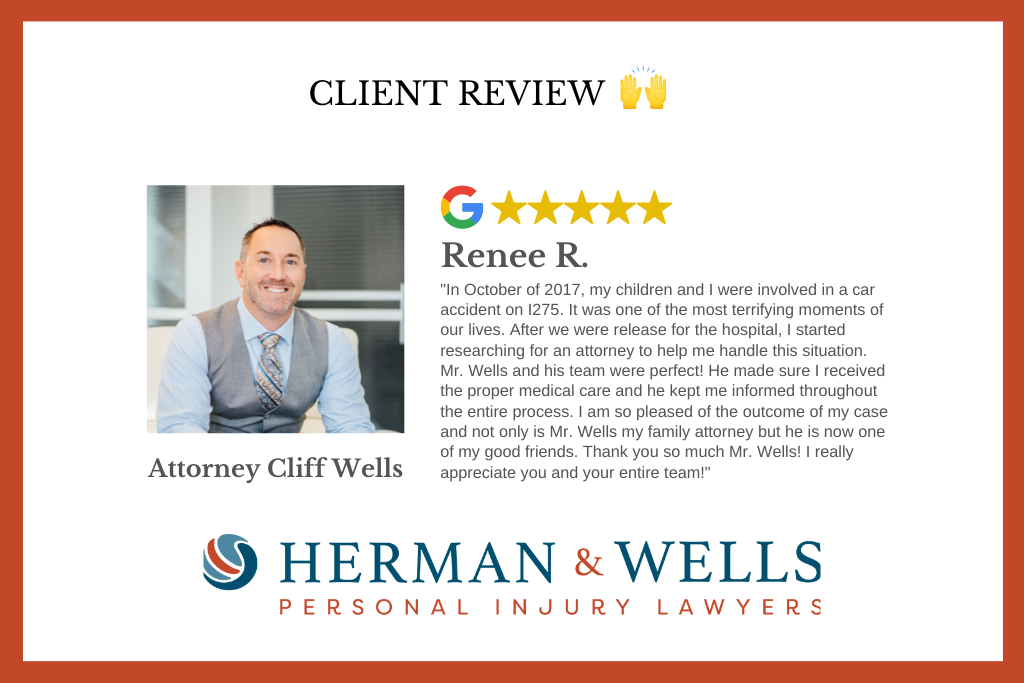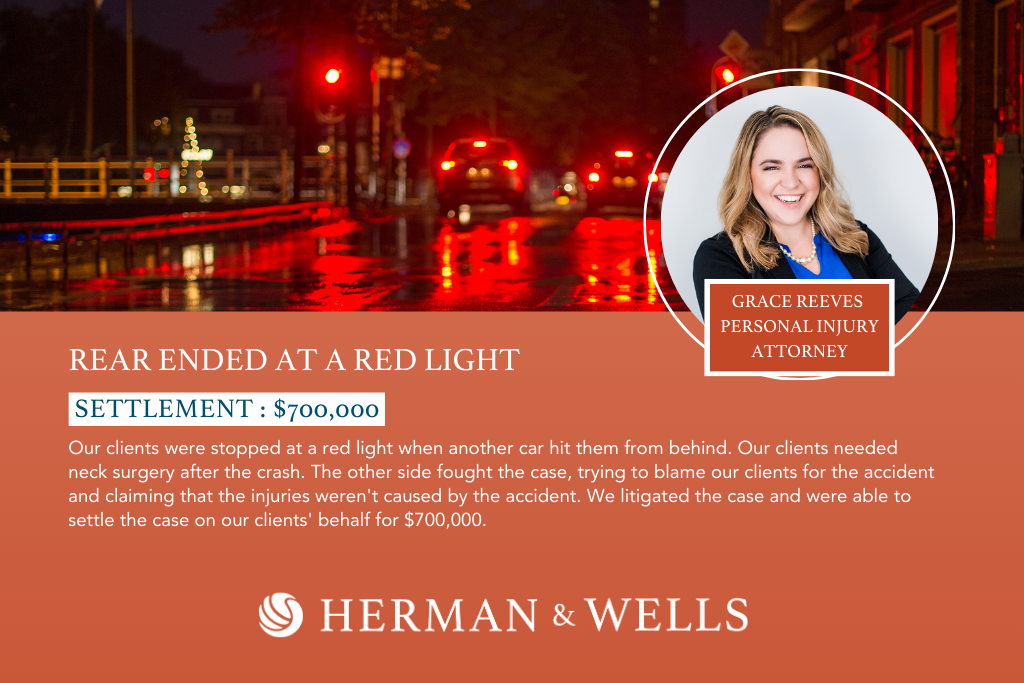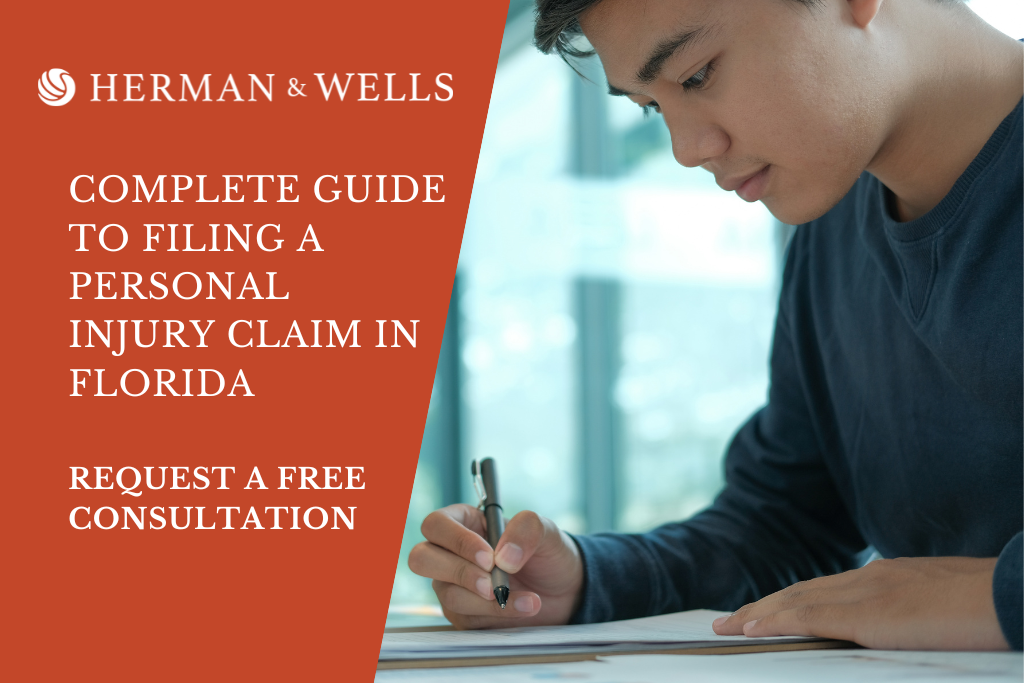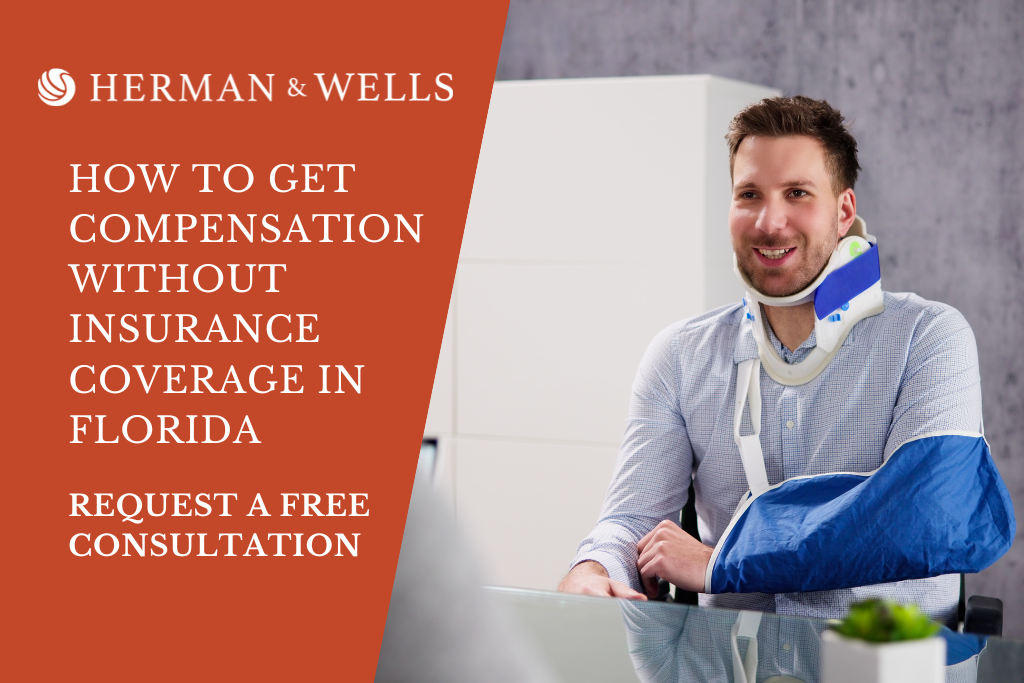Car accidents are a common occurrence in Florida, and understanding the legal landscape surrounding these incidents is important for anyone on the road. If you are in an accident, you must know your rights and the steps you should take immediately following an accident. Contact Herman & Wells at (727) 821-3195 today for expert guidance if you have questions.

The Cliff Notes: Key Takeaways From This Post
- 1Common Cause Of A Car Accident In Florida: Car accidents in Florida are often caused by distracted driving, speeding, and impaired driving.
- 2Florida Traffic Laws Related To Car Accidents: Florida traffic laws set the framework for determining fault and liability in car accidents.
- 3Immediate Steps To Take Following A Car Accident: After an accident, it’s important to remain calm and collect necessary information from all parties involved. Documenting the scene and gathering witness information can impact your claim.
- 4Checklist Of Actions To Secure At The Accident Scene: Take photos, exchange information, and notify law enforcement. These actions create a record that can support your case later.
- 5
How We Can Help: Contact Herman And Wells At (727) 821-3195.
Common Cause Of A Car Accident In Florida
In Florida, common causes of car accidents include distracted driving, speeding, and driving under the influence of drugs or alcohol. For instance, when Maria was involved in a crash caused by a texting driver, she learned firsthand how critical it is to be aware of the risks on the road. These factors contribute to the high rate of accidents in the state, making it essential for drivers to stay vigilant and adhere to traffic laws. By understanding these common causes, drivers can take proactive steps to minimize their risk of being involved in a collision.
Florida Traffic Laws Related To Car Accidents
Florida has specific traffic laws that govern how drivers must behave. These laws are designed to promote safety and reduce the number of accidents, including regulations on speed limits, lane changes, and yielding to pedestrians. When Maria received her citation for failing to yield at an intersection, she quickly learned the importance of following these laws to avoid accidents and potential liability. Familiarizing yourself with Florida’s traffic laws can help you make informed driving decisions, ultimately keeping you and others safe.
Florida’s No-Fault Insurance System Explained
Florida operates under a no-fault insurance system, meaning each driver’s insurance pays for their medical expenses and damages, regardless of who caused the accident. Maria discovered this firsthand after her accident; her insurance covered her medical bills, allowing her to focus on recovery rather than fighting over liability. It’s important to know the limits of your policy and the protections it offers to ensure you are adequately covered.
Immediate Steps To Take Following A Car Accident
After a car accident, knowing the right steps to take can significantly impact your recovery and compensation. First, check for injuries and call for medical help if necessary, ensuring everyone’s safety is the top priority. Next, gather essential information, including the other driver’s contact details and insurance information, as well as witness statements. Maria quickly learned that documenting everything at the scene, from photographs to police reports, was vital for her insurance claim and any potential legal action.
Checklist Of Actions To Secure At The Accident Scene
- Ensure safety first. Move vehicles to a safe location if possible.
- Call 911 to report the accident and request medical assistance.
- Collect information from all parties involved, including names, contact numbers, and insurance details.
- Document the scene with photographs of the vehicles, damages, and relevant road conditions.
- Obtain witness information and statements if available.
Importance Of Medical Attention And Documentation
Regardless of the severity of the accident, seeking medical attention is recommended. Many injuries may not be immediately apparent, and prompt medical care can help identify and treat them before they worsen. Maria’s decision to visit the hospital immediately after her accident ensured that her injuries were documented, which would later support her insurance claim. Additionally, keeping thorough medical records is vital for establishing a connection between the accident and any injuries sustained, thus strengthening your case.
Your Rights To Compensation Under Florida Law
In Florida, victims of car accidents are entitled to seek compensation for their medical expenses, lost wages, and pain and suffering. However, the no-fault system limits claims for non-economic damages unless serious injury thresholds are met. Maria learned that she needed to document her injuries and financial losses meticulously to maximize her compensation. Knowing your rights and the criteria for claiming damages can empower you to pursue the compensation you deserve.
Explanation of Personal Injury Protection (PIP) benefits
Personal Injury Protection (PIP) is a mandatory coverage in Florida that pays for medical expenses, lost wages, and other related costs, regardless of who is at fault. Maria found that her PIP benefits covered a significant portion of her medical bills, providing relief during her recovery. It’s important to understand the specifics of your PIP coverage, including any limits and exclusions, to ensure you are fully protected in the event of an accident. This knowledge can help you navigate the claims process more effectively.
Role Of Negligence In Florida Car Accident Claims
Negligence is a crucial factor in determining liability in car accident claims in Florida. To establish negligence, it must be shown that the at-fault driver failed to act reasonably, causing harm to another party. For example, if a driver runs a red light and causes an accident, they may be deemed negligent. Understanding how negligence is assessed can help you build a stronger case if you pursue compensation.
How Negligence Is Determined In Florida
In Florida, negligence is determined by examining whether a driver’s actions fell below the standard of care expected on the road. Factors like speeding, distracted driving, or driving under the influence are often considered when establishing fault. Maria learned through her case that clear evidence of negligence could significantly strengthen her claim against the other driver. Knowing how negligence is evaluated can help you gather the necessary evidence to support your position.
Comparative Fault And Its Effect On Your Claim
Florida follows a comparative fault system, meaning that your compensation may be reduced based on your percentage of fault in the accident. If it’s determined that Maria was 20% at fault for not signaling a lane change, her total compensation could be reduced by that percentage. Understanding how comparative fault works is essential for drivers, as it can directly impact your compensation. This knowledge helps you prepare for discussions with insurance adjusters and legal representatives.

Dealing With Insurance Companies In Florida
Navigating the insurance claims process can be daunting, especially with large companies focused on minimizing payouts. Knowing your rights during negotiations is crucial for achieving a fair settlement. After her accident, Maria realized that insurance companies often employ tactics to delay or deny claims, making it essential to be proactive and persistent. Understanding how to communicate effectively with your insurer can help you receive the compensation you deserve.
Your Rights During Insurance Negotiations
As a policyholder, you have rights during insurance negotiations, including the right to receive a fair assessment of your claim. Maria discovered that she could challenge the insurance company’s decisions and negotiate for a more reasonable settlement. Awareness of your rights can empower you during discussions with insurers, enabling you to advocate for your interests. This knowledge can help you avoid being taken advantage of during the claims process.
Tips For Handling Claims And Disputes With Insurers
- Keep detailed records of all communication with the insurance company. Document every conversation with your insurer, noting the dates, names of representatives, and what was discussed. This record-keeping helps track your claim’s progress and can be valuable if there’s a dispute about what was communicated or agreed upon.
- Be prepared to provide supporting documentation for your claim. Collect and organize evidence like photos, repair estimates, medical bills, and receipts to support your claim. Thorough documentation gives you a stronger foundation, showing the full scope of your damages and ensuring the insurer has the information to process your claim accurately.
- Don’t accept the first settlement offer without evaluating its adequacy. Insurers may present an initial offer that doesn’t fully cover your damages. Review the offer and consider seeking advice from a professional or conducting your research to confirm if it fairly compensates you for your losses.
- If necessary, consider involving a personal injury lawyer to assist with negotiations. If your claim is complex or negotiations with the insurer stall, a personal injury lawyer can provide expertise in securing fair compensation. They’ll handle the negotiation process and ensure your interests are protected.
- Remain persistent and don’t hesitate to escalate disputes to a supervisor. If your claim isn’t progressing or you encounter uncooperative representatives, politely request to speak to a supervisor. Persistence shows you’re serious about your claim and increases the likelihood of resolving disputes in your favor.
The Statute Of Limitations For Car Accident Claims In Florida
In Florida, the statute of limitations for filing a car accident claim is two years from the accident date. Maria learned that missing this deadline could mean losing her right to compensation altogether. All accident victims must know these critical deadlines to ensure their claims are filed on time. Knowing the time constraints can help you prioritize your next steps after an accident.
Critical Deadlines For Filing A Claim
Timely filing of your claim is essential for protecting your rights. In addition to the two-year statute of limitations, there are often shorter deadlines for specific actions, such as notifying your insurance company of an accident. Maria’s experience highlighted the importance of proactively filing her claim and documenting all relevant details. Keeping track of these deadlines can help you avoid unnecessary complications and preserve your ability to seek compensation.
What Happens If I Miss The Statute Limitations?
If you miss the statute of limitations, you may lose your right to pursue legal action or receive compensation for your injuries and damages. Maria learned that once the deadline passed, her case would be barred from court proceedings, underscoring the importance of acting swiftly. Understanding the implications of these deadlines can motivate you to take immediate action following an accident. Knowing potential pitfalls can help you navigate the claims process more effectively.
How Our Florida Personal Injury Lawyers Can Help
Hiring a skilled personal injury lawyer can significantly improve your chances of receiving fair compensation after a car accident. Experienced attorneys understand the intricacies of Florida law and can navigate the complex claims process on your behalf. Maria realized that enlisting the help of a lawyer helped her build a strong case, allowing her to focus on her recovery while her attorney handled the negotiations. Knowing what to look for in a car accident, a lawyer can distinguish between a satisfactory settlement and a prolonged battle with insurers.
When seeking a car accident lawyer, consider their experience, reputation, and past success with similar cases. Maria found that choosing an attorney who specialized in personal injury law made a significant difference in her case outcome. Reading reviews, requesting referrals, and scheduling consultations can help you find the right representation for your needs. Being thorough in your research will ensure you select an attorney who will advocate.
Contact The Personal injury Lawyers of Herman & Wells
If you’ve been in a car accident in Florida, you don’t have to go through it alone. The personal injury attorneys at Herman & Wells can help you get the compensation you deserve.
Call us at (727) 821-3195 for a free consultation.





